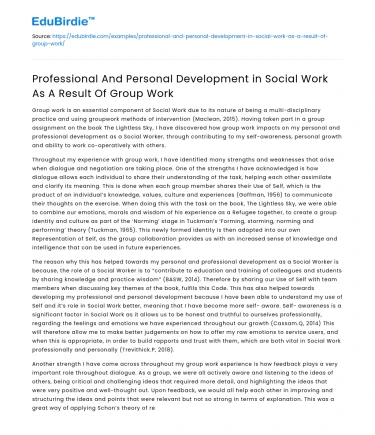Group work is an essential component of Social Work due to its nature of being a multi-disciplinary practice and using groupwork methods of intervention (Maclean, 2015). Having taken part in a group assignment on the book The Lightless Sky, I have discovered how group work impacts on my personal and professional development as a Social Worker, through contributing to my self-awareness, personal growth and ability to work co-operatively with others.
Throughout my experience with group work, I have identified many strengths and weaknesses that arise when dialogue and negotiation are taking place. One of the strengths I have acknowledged is how dialogue allows each individual to share their understanding of the task, helping each other assimilate and clarify its meaning. This is done when each group member shares their Use of Self, which is the product of an individual’s knowledge, values, culture and experiences (Goffman, 1956) to communicate their thoughts on the exercise. When doing this with the task on the book, The Lightless Sky, we were able to combine our emotions, morals and wisdom of his experience as a Refugee together, to create a group identity and culture as part of the ‘Norming’ stage in Tuckman’s ‘Forming, storming, norming and performing’ theory (Tuckman, 1965). This newly formed identity is then adopted into our own Representation of Self, as the group collaboration provides us with an increased sense of knowledge and intelligence that can be used in future experiences.
Save your time!
We can take care of your essay
- Proper editing and formatting
- Free revision, title page, and bibliography
- Flexible prices and money-back guarantee
The reason why this has helped towards my personal and professional development as a Social Worker is because, the role of a Social Worker is to “contribute to education and training of colleagues and students by sharing knowledge and practice wisdom” (BASW, 2014). Therefore by sharing our Use of Self with team members when discussing key themes of the book, fulfils this Code. This has also helped towards developing my professional and personal development because I have been able to understand my use of Self and it’s role in Social Work better, meaning that I have become more self- aware. Self- awareness is a significant factor in Social Work as it allows us to be honest and truthful to ourselves professionally, regarding the feelings and emotions we have experienced throughout our growth (Cassam.Q, 2014) This will therefore allow me to make better judgements on how to offer my raw emotions to service users, and when this is appropriate, in order to build rapports and trust with them, which are both vital in Social Work professionally and personally (Trevithick.P, 2018).
Another strength I have come across throughout my group work experience is how feedback plays a very important role throughout dialogue. As a group, we were all actively aware and listening to the ideas of others, being critical and challenging ideas that required more detail, and highlighting the ideas that were very positive and well-thought out. Upon feedback, we would all help each other in improving and structuring the ideas and points that were relevant but not so strong in terms of explanation. This was a great way of applying Schon’s theory of reflecting in and on action to our team work, which is a theory used to explain when we are in the middle of a situation or after an event and are constantly thinking, feeling and adjusting our actions (Thompson, 2018) to inform our judgement on the task we were all tackling. Whilst discussing ideas and providing feedback simultaneously, we were reflecting in action, and when we all attempted to expand on particular ideas after the dialogue, we were reflecting on action and on the feedback provided.
To further acknowledge the importance of reflection, feedback from my peers has given me an insight on my perceived gaps in knowledge which are in the blind spot of The Johari Window. The Johari window is a model consisting of four windows: open, blind, unknown and hidden; used to promote self-awareness and perception of others and one’s self (Luft, 1955). Reflecting on the weaker areas that were highlighted in my blind spot, initiated an action-response in me, to research individually and communicate through questioning with the help of my peers, to fill in these gaps in my knowledge. From this, I began to understand the grey areas that had been highlighted and therefore, this information will have been transferred from the blind spot to the open area of The Johari Window. In the open area, the information is now known by myself and my group members, promoting self-awareness.
This has contributed to my personal and professional development as a Social Worker because, reflective practice is needed at all times in Social Work to summarise, review and deeply-embed knowledge obtained throughout learning (Horner, 2019). This is supported by the quote “Social Workers should take responsibility for ensuring they have access to professional supervision and discussion which supports them to reflect and make sound professional judgements based on good practice” (BASW, 2014). Therefore, by developing an insight into reflective thinking with my group through being open, and challenging each other through mutual critical evaluation (Maclean, 2015) I have managed to achieve this to so that it can be applied to future practice.






 Stuck on your essay?
Stuck on your essay?

